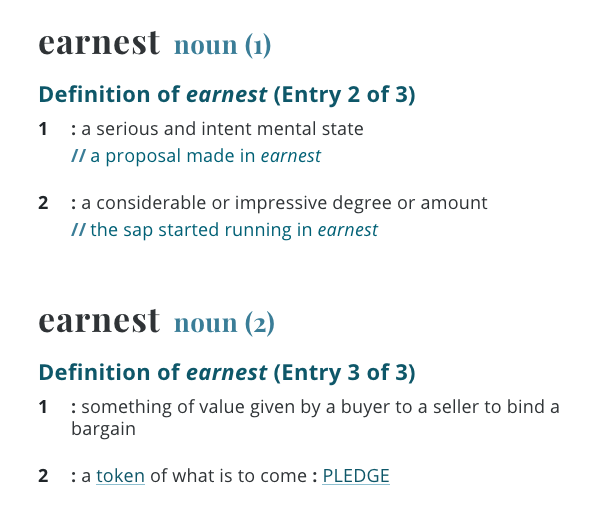Image “Money” by 401(K) 2012, licensed under Creative Commons

This is a conversation I have with every single buyer: What is earnest money? Earnest money is the money you lose if you back out of the transaction without a “good reason.” But it’s a little more complicated than that.
A buyer provides earnest money immediately after their offer is accepted (usually by way of personal check, cashier’s check, or wire transfer). Most often, this earnest money will be held by the escrow company during the course of the transaction. If the buyer defaults on the purchase contract, the seller is allowed to keep all or some of the earnest money (in most cases). As long as the transaction closes successfully, the earnest money deposit goes towards the buyer’s downpayment.
There is no required amount for earnest money, but in the Seattle area the convention is around 3-5% of the price. More earnest money makes for a stronger offer. I always tell my clients that as long as the buyer doesn’t foresee getting cold feet, a higher earnest money deposit is a good way to strengthen an offer without costing them more money in the end. Plus, even in the case of buyer default, our standard forms cap the amount of earnest money the seller can retain at 5% of the purchase price.
So, if a buyer backs out of a transaction, they automatically lose their earnest money? NO! There are a number of contingencies included in most offers that provide protection for buyers. If a buyer decides to terminate the purchase for a reason covered by a contingency, the buyer gets their earnest money back. It’s only if a buyer backs out of a transaction outside of a contingency that they risk losing it.
Different contingencies allow different ways for the buyer to terminate the purchase and retain their earnest money. Each contingency has certain steps a buyer must take, and most contingencies also have different time periods associated with them. Talk to your real estate agent to make sure you understand the contingencies available and which ones you want to include with your offer.
In highly competitive markets, there are all sorts of tricks that buyers might use to make their offers more competitive. This might include waiving contingencies, where a buyer chooses to give up some or all of their protections. Sometimes buyers include “nonrefundable earnest money” or have their earnest money automatically convert to a “nonrefundable deposit” after X number of days. This means that the earnest money is released to the seller before closing, and there is virtually no chance the buyer would get it back (with a few exceptions). Releasing the earnest money may seem risky for the buyer, but it gives the seller extra assurance the transaction will close. And if it still fails to close, then at least the seller is guaranteed some cash.
Regardless of how you choose to structure your offer, it’s important to know what earnest money is, why you need it, and the legal ramifications of terminating the purchase contract.
 Facebook
Facebook
 Twitter
Twitter
 Pinterest
Pinterest
 Copy Link
Copy Link
